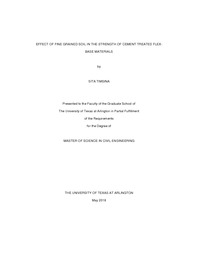
ATTENTION: The works hosted here are being migrated to a new repository that will consolidate resources, improve discoverability, and better show UTA's research impact on the global community. We will update authors as the migration progresses. Please see MavMatrix for more information.
Show simple item record
| dc.contributor.advisor | Hossain, Sahadat | |
| dc.creator | Timsina, Sita | |
| dc.date.accessioned | 2018-06-05T17:16:02Z | |
| dc.date.available | 2018-06-05T17:16:02Z | |
| dc.date.created | 2018-05 | |
| dc.date.issued | 2018-05-01 | |
| dc.date.submitted | May 2018 | |
| dc.identifier.uri | | |
| dc.identifier.uri | http://hdl.handle.net/10106/27407 | |
| dc.description.abstract | The recycled materials such as, Recycled Crushed Concrete Aggregates (RCCA) and Reclaimed Asphalt Pavement (RAP) treated with cement has been widely used as the alternative granular base in pavement construction in different states in USA due to the depletion of natural resources of virgin aggregates. While a number of factors drive the use of these recycled materials, the two primary factors are economic savings and environmental benefits.
In the flexible pavement systems, the base layer contributes to the structural capacity of the pavement systems, so, the quality performance of this layer is essential. However, presence of fine particles in the pavement system promotes the contamination of coarse granular material due to migration of fines from the subgrade which might adversely affect the strength and stiffness of flex-base. As such, the main purpose of this study was to examine the effect of fine contents in granular base materials in terms of strength and stiffness.
In this research, a comprehensive experimental program was designed to characterize resilient and compressive behavior of recycled materials in the presence of soil in both natural and stabilized forms. For this study, RAP and RCCA were mixed at different proportions from 0% to 100% with different amount of soil mixture varying between 0% and 24% with cement content ranging from 0% to 6% at 2% interval. Different laboratory tests were conducted to determine the Optimum Moisture Content (OMC), Maximum Dry Density (MDD), Unconfined Compressive Strength (UCS) and Resilient Modulus (MR) of the mixes of RAP, RCCA, soil and Ordinary Portland Cement (Type I/II). Based on the preliminary data, it was found that with the intrusion of fines in cement treated as well as untreated recycled granular bases, both the strength and stiffness decrease as compared with the same specimens without fine particles. With the addition of 12% and 24% of soil in the combination of 30% RAP + 70% RCCA and 50% RAP + 50% RCCA, the value of resilient modulus decreased in the range of 30 -55% in the cement stabilized as well as natural forms. For example,the Mr value of (30/70) RAP/RCCA with 2% cement ranged between 10,000 psi and 45,000 psi, it was reduced to a range of 10,000-30,000 psi with 12% soil intrusion. Similarly, at 6% cement content the Mr value of (30/70) RAP/RCCA the highest value of resilient modulus of 75,000 psi was observed whereas with the 12% soil, the moduli value was reduced to 38,000 psi at the given maximum confining pressure of 20psi. | |
| dc.format.mimetype | application/pdf | |
| dc.language.iso | en_US | |
| dc.subject | RAP | |
| dc.subject | RCCA | |
| dc.subject | Expansive clay | |
| dc.title | Effect of fine grained soil in the strength of cement treated flex-base materials | |
| dc.type | Thesis | |
| dc.degree.department | Civil Engineering | |
| dc.degree.name | Master of Science in Civil Engineering | |
| dc.date.updated | 2018-06-05T17:18:10Z | |
| thesis.degree.department | Civil Engineering | |
| thesis.degree.grantor | The University of Texas at Arlington | |
| thesis.degree.level | Masters | |
| thesis.degree.name | Master of Science in Civil Engineering | |
| dc.type.material | text | |
| dc.creator.orcid | 0000-0001-8434-8319 | |
Files in this item
- Name:
- TIMSINA-THESIS-2018.pdf
- Size:
- 2.836Mb
- Format:
- PDF
This item appears in the following Collection(s)
Show simple item record


